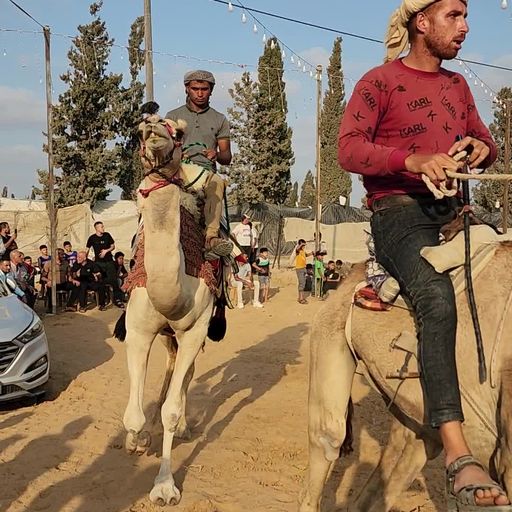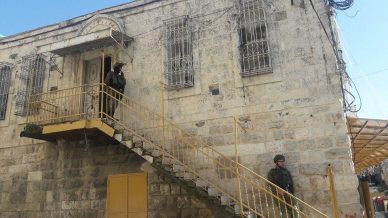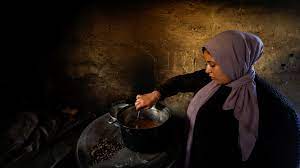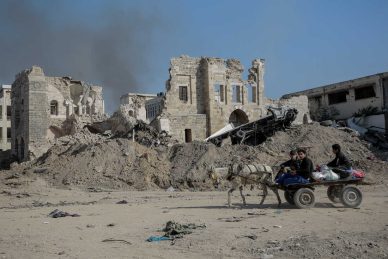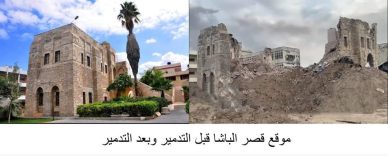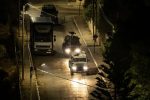In the warmly grandiose environment of Nusairat Refugee camp a march of horses and camels brings together all parts of the community and tribe in a joyful event called Sabiat Alkhail held a few days before the day of Palestinian Bedouin wedding.
Sabiat Alkhail or roughly translated into English as March of horses is a Bedouin tradition that takes place during special and happy festivals through a parade of horses and camels. In celebration of a wedding in the Jbairy family riders adorn their camels and horses with distinctive accessories that symbolize their commitment to their community’s origins in their occupied lands. Relatives neighbors and friends gathered from different locations to share the groom and his family with their wedding.
Dozens of young men participate in this Bedouin wedding tradition wearing traditional clothing decorated with leather belts and straps that cross on the chest. Leading their horses whose forelocks are decorated with colorful woolen threads they travel as a group all the way to the Bedouin wedding venue.
As soon as the afternoon prayer ends the well-wishers congratulate the groom’s family while the wide dirt ground shook with the blows of the horses’ hooves speeding in front of the crowds of the groom’s family.
Hundreds of citizens line up on both sides of the road to enjoy watching the dance performances performed by the horsemen. The dance is a specific pattern known to the horses and is followed by short races which allow the horses riders showcase their skills. Often these processions can last for several hours.
From tents to carpets to belts for camel saddles horse bridles and girths are all decorated by handmade weavings and embroideries depicting images of Palestinian identity. Fikrey Ibrahim cameraman and uncle of the groom notes that the decorative symbols done in traditional weaving technique central to the culture and lifestyle of the Bedouin includes imagery of the Palestinian flag Kufiyya traditional embroidery and other objects that express Palestinian longing for their occupied homeland.
The “Sabiya riders” believe that they are naturally invited to any Bedouin wedding that they hear of and attend without need to wait to receive the invitation. Their presence on the backs of their horses and camels gives them the title of “Nashmi&rdquo meaning one who performs a duty without being asked.
These traditions at Bedouin weddings disappeared for a few years due to repeated Israeli aggressions and Palestinian struggles but community members have worked hard to restore these traditional experiences in recent years.
Hazem Abu Zayed one of those who helped revive this Palestinian Bedouin tradition said “Our tradition is our history and identity.” He also commented “We resist the occupation by preserving our Palestinian heritage.”
According to Abu Zayed “In the past the march of horses used to last for ten days or more but nowadays they last just a day or two because of many things related to the deteriorating economic conditions and the changing of the way of life from before the occupation to now as Palestinian refugees based in the Gaza Strip.”
Some Bedouin tribes still maintain this custom which is fighting extinction such as the Bedouin families in the town of Deir al-Balah in the central Gaza Strip. The Jbairy clan whose family origins are from occupied Beersheba in southern Palestine is one of the clans that adhere to the ancient customs of Palestinian Bedouin wedding where this recent procession was held.
By the end of the day before sunset the houses riders leave to pave the way for other celebrations and dances to continue through the night. According to Abu Zayed “the Bedouin population in the Gaza Strip were either expelled or forced to flee by the Zionist militias in 1948 to the surrounding countries such as Jordan Egypt Gaza and the West Bank yet they still preserve their traditions and customs.”

